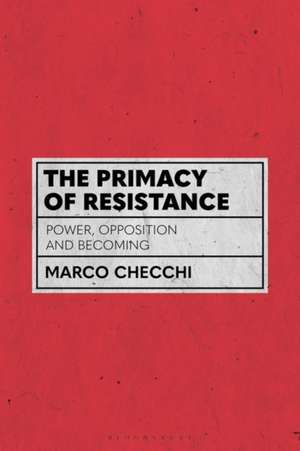The Primacy of Resistance: Power, Opposition and Becoming
Autor Marco Checchien Limba Engleză Hardback – 10 feb 2021
| Toate formatele și edițiile | Preț | Express |
|---|---|---|
| Paperback (1) | 198.30 lei 6-8 săpt. | |
| Bloomsbury Publishing – 24 aug 2022 | 198.30 lei 6-8 săpt. | |
| Hardback (1) | 569.53 lei 6-8 săpt. | |
| Bloomsbury Publishing – 10 feb 2021 | 569.53 lei 6-8 săpt. |
Preț: 569.53 lei
Preț vechi: 816.40 lei
-30% Nou
Puncte Express: 854
Preț estimativ în valută:
108.98€ • 116.54$ • 90.86£
108.98€ • 116.54$ • 90.86£
Carte tipărită la comandă
Livrare economică 17 aprilie-01 mai
Preluare comenzi: 021 569.72.76
Specificații
ISBN-13: 9781350124455
ISBN-10: 1350124451
Pagini: 264
Dimensiuni: 156 x 234 mm
Greutate: 0.54 kg
Editura: Bloomsbury Publishing
Colecția Bloomsbury Academic
Locul publicării:London, United Kingdom
ISBN-10: 1350124451
Pagini: 264
Dimensiuni: 156 x 234 mm
Greutate: 0.54 kg
Editura: Bloomsbury Publishing
Colecția Bloomsbury Academic
Locul publicării:London, United Kingdom
Caracteristici
This text provides an innovative rethinking of Foucault's model of power relations that leads towards a new autonomism for the 21st century
Notă biografică
Marco Checchi is Lecturer in Business and Law, De Montfort University, UK.
Cuprins
1. Approaching the primacy of resistance 2. "Resistance comes first": metamorphoses, change and the primacy of resistancePART I - HISTORICAL CLOSURES 3. The naturalistic account of the primacy of resistance. La Boétie's natural companionship and the liberal closure 4. The primacy of labour: processes of extensification and scenarios of extinction from Autonomia to biofinancialisation PART II - CONTEMPORARY OPENINGS 5. The interruption of politics and the affirmation of potentia: openings of resistance between Rancière and Negri 6. R-existence, or resistance and becoming. The materialist ontology of the primacy of resistance 7. A conclusive opening: at last resistance comes first
Recenzii
The Primacy of Resistance is a beginning and foundation from which to develop such theories [on resistance and power]. Checchi has opened the door and is welcoming us in ... This makes the work a welcome contribution to the contemporary field of Foucault studies and also creates a new and rich avenue of possible further study.
The Primacy of Resistance provides an important resource for understanding resistance and its potential for initiating and sustaining radical social change.
Finally a single book has traced out and clarified a crucial thesis in political theory that has not received nearly enough attention. Political resistance has been wrongly understood as a mere reaction or opposition "against" power. By treated it as such we have taken the side of power and completely misunderstood the creative and dynamic nature of resistance. This book is the most systematic and historical development of this idea that I am aware of. It is well-researched, well-argued, and should be taken seriously by anyone doing political theory today.
The Primacy of Resistance provides an important resource for understanding resistance and its potential for initiating and sustaining radical social change.
Finally a single book has traced out and clarified a crucial thesis in political theory that has not received nearly enough attention. Political resistance has been wrongly understood as a mere reaction or opposition "against" power. By treated it as such we have taken the side of power and completely misunderstood the creative and dynamic nature of resistance. This book is the most systematic and historical development of this idea that I am aware of. It is well-researched, well-argued, and should be taken seriously by anyone doing political theory today.
